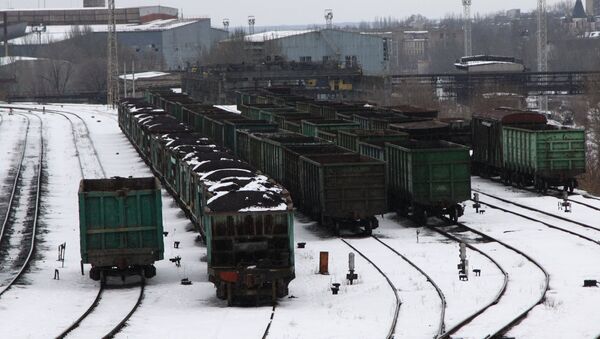MOSCOW (Sputnik) — Kiev should do the utmost to stop the blockade of the conflict-torn eastern region of Donbass, Russian Foreign Minister Sergei Lavrov said on Thursday.
"The ongoing blockade of Donbass which is organized by nationalist, if not to say Nazi, battalions and other organizations is unacceptable… We urge the Ukrainian government to apply all its forces to stop this blockade," Lavrov said at a press conference following the meeting with German Foreign Minister Sigmar Gabriel.
Russia hopes that the work to work out a roadmap on implementation of the Minsk agreements on resolution of the crisis in Ukraine will be accelerated, Lavrov said.
"We expect that this work will be accelerated because it is really being dragged out," he said.
In his turn, Gabriel said Berlin believes that there presently are no premises for a successful political resolution of the crisis in in Donbass.
"Unfortunately, amid different justifications, not even the minimal standards are being met – the ceasefire, heavy weaponry withdrawal, humanitarian aid, access for the Red Cross, prisoner exchange. These are the minimal premises for a successful political process," the German top diplomat said.
In late December 2016, the so-called Ukrainian volunteer fighters group declared a trade and economic blockade of the Donetsk People's Republic (DPR) and Lugansk People’s Republic (LPR).
The republics decided to impose receivership regime on Ukrainian enterprises in the area on March 1 in response to the transport blockade.
In February 2015, Kiev forces and Donbass independence supporters signed a peace agreement in the Belarusian capital of Minsk. The deal stipulates a full ceasefire, weapons withdrawal from the line of contact in Donbass, as well as constitutional reforms that would give a special status to the Donetsk and Lugansk People's Republics. Despite the agreement brokered by the Normandy Four states, the ceasefire regime is regularly violated, with both sides accusing each other of multiple breaches, undermining the terms of the accord.
Lavrov added that Russia considers it inexpedient to reduce the work of the NATO-Russia Council to the discussion of Ukrainian issues.
"If each time our colleagues from the alliance tell us: yes, we will meet in the Russia-NATO Council, but we will only discuss Ukraine — well, this is the continuation of such a paranoid, aggressive policy," he said.
"NATO has nothing to do with the efforts on the Ukrainian settlement. If the essence of these ideas is to use the Russia-NATO Council for another confrontation, then we do not want to play such games," Lavrov said.
The latest Russia-NATO Council was expected to gather on March 3, however, it never took place. The sides were planning to discuss additional measures to ensure dialogue between military and civil experts to resolve the problem related to the inconsistencies in procedures, regulating civil and military aviation.




